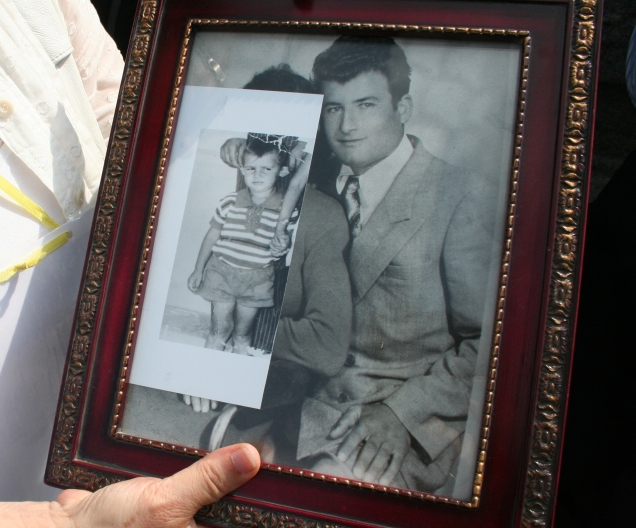On 16 July, Lobby for Cyprus held its annual seminar at Cyprus Week, which takes place at Theatro Technis in London every year. The theme of this year’s event was a remembrance of those listed as missing following the Turkish invasion of Cyprus in 1974. In collaboration with the Organisation of Relatives of Missing Cypriots (UK), the tragic stories of the missing persons of Cyprus were told from the perspective of their relatives.
Following an introduction by Lobby for Cyprus assistant coordinator Nick Kounoupias, Toulla Savva was the first of the speakers to give her story. Toulla’s brother Andreas Savva, was studying medicine in Greece when the Turkish invasion of Cyprus first commenced. Feeling duty-bound to help his compatriots, Andreas returned to his family in the village of Alambra in order to assist with the desperate struggle. Although Andreas’ remains were found last year, the pain and confusion still continues for his family who have no answers about the circumstances of his untimely death.
Helen Anastasi read out the account of Kika Kattirtzi who is from the village of Ayios Amvrosios, Kyrenia. Kika’s brother Georgios Drakou went missing while serving in the Cyprus National Guard. For years his family hoped for news and answers. After 36 long years of waiting, Georgios’ body was found in a mass grave near Kyrenia, along with 40 other soldiers who were taken prisoner and all murdered in cold blood. George’s remains showed that he had been shot in the back of the head, thereby providing evidence of crimes committed by Turkey in violation of the Geneva Conventions and the laws of war.
Kendeas Yiannaki told the story of his father, Theodosis Yiannaki, from the village of Achna in Famagusta. Theodosi was seen alive by eyewitnesses, handcuffed, blindfolded and in the custody of Turkish forces. After passing through a UN checkpoint, Theodosi was interrogated and tortured by Turkish soldiers who sought information about arms, despite the fact that Theodosis was a non-combatant. He was then taken to a Turkish hospital in Nicosia to be treated for the injuries inflicted upon him during the ordeal. He was last seen after having emergency surgery to amputate both legs and has been registered as missing ever since.
Liza Matsangou read an account written by Xenia Chambou and Leonidas Zacharias, whose brother Panayiotis Zachariou has been missing since 1974. Panayiotis, who was from the village of Ayios Andronikos in Karpasia was 20 days away from finishing his national service when the first invasion happened and he was called to duty. After so many years of anguish, Panayiotis’ mother took her own life at 67-years-old, unable to continue living with the pain. Today, Panayiotis’ seven siblings are still waiting for information and answers from Turkey.
Finally, Niki Hatjoullis gave her account about two missing family members. Her case is perhaps the most well-known as her brother Christakis Georgiou (pictured above) is the youngest person on the Cyprus missing persons register. Last seen in the hands of Turkish forces at just five-years-old after being shot in both legs, Turkish documents have revealed that Christakis was sent to Ankara for treatment. Niki’s father Georgios Loizou (pictured above) has also been missing since 1974, leaving her family to search endlessly for answers and in hope that Christakis is still alive, somewhere.

Neoklis Neokleous, Chairman of the Organisation of Relatives of Missing Cypriots (UK), addressed the audience to explain that the issue of the ‘disappeared’ remains unresolved 41 years on, because Turkey refuses to cooperate with sincerity. Turkey ignores relevant United Nations resolutions, European Parliament resolutions and European Court of Human Rights judgments. The Turkish government declares that it supports the work of the UN Committee on Missing Persons in Cyprus, but in actual fact undermines. Turkey denies access to areas for searches and is accused of removing skeletal remains from original burial places. The remains that have been found so far were discovered due to intelligence provided by private individuals. Turkey’s behaviour not only heightens and prolongs the agony of the relatives but also shows total disregard for the institutions it is a member of, or aspires to be a member of.
The Turkish government declares that it supports the work of the UN Committee on Missing Persons in Cyprus, but in actual fact undermines it by denying access to areas for searches and removes skeletal remains from original burial places.Neoklis Neokleous, Chairman of the Organisation of Relatives of Missing Cypriots (UK)
To end with, Dr Theodora Christou spoke to give her expert opinion as a human rights lawyer on the inaction of Turkey in the case of the missing. As Theodora explained, despite its responsibility to the victims and their families to locate the missing persons, Turkey refuses to conduct effective investigations and often provides inaccurate information in order to hamper the search for those who have not yet been found. Since 1974, the Turkish authorities have worked on the principle that the passage of time will dilute evidence or fade memories.
As this event illustrated, the memory of the missing can never be forgotten and time cannot undo the war crimes carried out by Turkey during its invasion and subsequent occupation of Cyprus.
Further information:
Organisation of Relatives of Missing Cypriots (UK)
Organisation of Relatives of Undeclared Prisoners and Missing Persons (Cyprus)
The Committee on Missing Persons in Cyprus (CMP)







